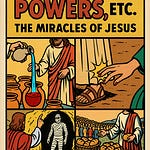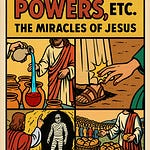Revelation 22.1-6, 17, 20-21
On Tuesday I buried the wife of a very dear friend.
With the body of his beloved at rest before him and his sobbing daughter beside him, struggling to stay on her feet, I looked first at him and then to the hundreds gathered around him and I gospeled them. “Because Jesus lives with death behind him,” I announced, “so shall you live.” “The next voice she hears will be the Lord Jesus calling her at the resurrection into the Last Future,” I proclaimed.
Only moments ago, at the font, with water and the Spirit, we gospeled Maggie Rose. We demanded the Spirt of Jesus hand over the goods to her, “…wash away her sin and clothe her in Christ’s righteousness throughout her life; so that, dying in the waters of baptism and being raised up with Christ in the waters of baptism, she may share in his final victory.”
In between the scripture and the sermon, with the words of the psalmist we reiterated the declaration of the Second Helvetic Confession, “The preaching of the word of God is the word of God.” As long as it is in the mode of gospel, this is the present-tense, living word of God to you this day.
At the table a few moments hence, around loaf and cup, with the authority of the Lord Jesus himself, we will announce the absolution of all your sins and then we will place God as an object in your hands and on your lips and in your bellies. Like Mary, there will be a space for God in you too.
Because I live so shall you live.
All your sins are forgiven.
This is my body given for you.
This is the word of God for the people of God.
Those are all unconditional promises.
And they are all penultimate promises to the unconditional promise with which the scriptures conclude; namely, the whither of God’s history with us is not an End which we should dread but for which we are right to desire, “Come Lord Jesus!”
We seldom stop to consider it, but it is precisely the unconditionality of the gospel that raises moral quandaries about God’s history with us.
Quite simply—
If all of history will end not in termination but in fulfillment and if God can promise that future without condition or qualification or equivocation and if we can trust his promises, then clearly— as a matter of pure logic— no events in history are beyond his control.
One day “God will be all in all,” scripture promises unconditionally. Only a God who works all in all can promise to become all in all. As Martin Luther writes, “If you doubt…that God wills all things…necessarily and immutably, how will you be able…to rely on his promises?” Our unease with the doctrine of predestination, Luther averred, is really our distrust of God. It is exactly the God revealed in Jesus’s crucifixion and resurrection— the God of unconditional love— within whose will all things occur. Or to put the claim as starkly as the psalmist does, “This is the day the Lord is making.” Just so, given what in fact occurs in the world, God’s sovereign rule remains morally opaque.
We are in the midst of a story whose coherence cannot yet be told.
It can only be promised.
And taken on faith.
John Green is one of the most critically acclaimed and popularly beloved Young Adult authors of the last fifteen years. In 2014, Time Magazine included him on their list of the one hundred most important people. Green’s first novel, Looking for Alaska, centered on the death of the protagonist’s friend and how his tragic death raises difficult questions about the meaning of life. In the Fault in Our Stars, which was later made into a popular film, two teenagers meet in a support group and fall in love only to lose each other to terminal cancer.
Despite his critical and commercial success as a young adult novelist, it’s possible to say that none of those books would exist had John Green not lost his faith in the face of what in fact occurs in the world. As a result, he abandoned his plan to one day write sermons and turned to writing books.
After graduating from Kenyon College, Green enrolled in the University of Chicago’s School of Divinity with the goal of pursuing ordination as an Episcopal priest. Before beginning his coursework at the divinity school, Green applied for a five month apprenticeship as a student chaplain at the Nationwide Children’s Hospital in Columbus, Ohio.
As John Green admitted to Jonathan Goldstein of Gimlet Media, before the apprenticeship his faith had been abstract and philosophical. His participation in the life of the church was shallow. He’d never attended a funeral where the casket was shorter than the minimum height for a roller coaster. He’d never sat in a congregation and listened to prayer requests for a church member’s remission that never arrived. He’d never before been in a position to be struck by the blunt force fact that we have a world of suffering and a God whose sovereignty somehow wills it— whether directly or indirectly. The hospital chaplain assigned Green to the children’s cardiac and neurology units. It was Green’s first job.
“I was a terrible chaplain,” he admits, looking back on the experience. Green fainted at the sight of wounds. Green spoke when he should’ve shut up and sat shiva. When parents of patients asked those inexorable questions (Why…? Where…?) Green ventured explanations. During his third night on call at the children’s hospital, the trauma pager beeped, summoning Green to the Emergency Room where he saw a doctor puking into a trash can as she wept. The helicopter had brought to the hospital a three year old boy who was screaming in agony.
“The smell of the burnt boy was terrible,” John Green says.
The boy’s dad had been burning leaves. A sudden wind turned it into a brushfire. As he ran inside to call the fire department, the fire swept over his son who was standing at the edge of the garage in his novelty cowboy boots. When the boy’s small town pediatrician arrived, she immediately began sobbing. To see all the medical professionals so unsettled by the little boy’s suffering, “It freaked me out.” Green sat with Nick’s parents in a windowless family room all that night, overwhelmed by the knowledge that he was out of his depth and that his faith was much too shallow. The next morning he handed the trauma pager over to another chaplain and he went home and showered for an hour and a half. “I couldn’t wash the smell off of me, and I couldn’t stop thinking about that kid and his parents,” Green recalls, “And frankly, I was relieved that I got to hand over the pager and go home. I was relieved I got to go home because I knew they wouldn’t. I was sure he wouldn’t go home.”
When John Green returned to the children’s hospital for his next shift, Nick was gone and, with him, so was Green’s faith. “I just couldn’t see God in that experience. I couldn’t find an answer for why God would allow for that to happen to a little boy. And I thought, ‘How can you do this as a job? How can you wade into people’s suffering and speak of God?”
Green stopped going to church. He dropped out of seminary before he’d ever taken a single course. He started writing, first for magazines then novels. “My books— the characters are all versions of me trying to make sense of that experience with Nick. But I keep writing so obviously I’ve never been able to make sense of it.” Despite writing and therapy, the little burned boy in agony remained ever present on Green’s mind. For years Green would type Nick’s full name into the search bar on Google only to have second thoughts and press command-A-delete.
Green even prayed for Nick. Every night, he prayed for Nick and Nick’s parents. Every night, for twenty years, he prayed to the God in whose rule he no longer believed.
Green was still in the midst of a story whose plot he could not yet discern.
There’s an unconditional promise at the end of the third chapter of the prophet Jeremiah’s Lamentations, “The steadfast love of the Lord never ceases. His mercies never come to an end. They are new every morning. Great is your faithfulness."
Illuminatingly, the preceding verses in no way prepare the listener for Jeremiah’s burst of gospel:
"I am one who has seen affliction under the rod of God's wrath. He has driven and brought me into darkness without any light. He has put heavy chains on me. Though I call and cry for help, he shuts out my prayers. He is a bear, lying in wait for me. A lion in hiding. He led me off my way and tore me to pieces. He shot into my guts the arrows of his quiver. He has made me drink wormwood. He has made my teeth grind on gravel and made me cower in ashes. My soul is bereft of peace…”
The promise follows a plot.
Or rather, the promise is storied.
In other words, the prophet Jeremiah is reflecting back on his vocation and testifying to how he experienced the history God was making with him. Jeremiah is confessing, “I woke up and I realized God wasn't torturing me. God was healing me. I was in surgery. And when I was in surgery, it felt like God was punching me and biting me and ripping me apart. But in fact, the Lord was opening me up and cutting the cancer away. I was just awake enough under the anesthetic to think that I was being killed, but really I was being saved from death.”
Thus, Lamentations 3 is the whole Bible in nuce.
Of course Jeremiah’s point is that this is what it is like to live with God. To so live is to recognize that what we think is happening is never what’s really happening because we can have no sense of the ending when we’re in the middle of the history God is making. We only have the promise to find our way through to the End, “Great is your faithfulness.”
One day during the pandemic author John Green once again typed Nick’s name into the Google search bar only this time he dared to click search. In an instant, Nick’s Facebook page popped up. He’d survived. Since the fire, his parents had gotten married. He’d graduated from college and was now enrolled in graduate school. His face bore no visible scars.
Scrolling through the likes and links on Nick’s Facebook page, Green started to laugh and weep, “I’m just so glad that he’s alive. I’m just so glad that everyone is alive. It’s a freaking miracle, you know, that any of us is here.”
Green wrote a letter to Nick and a few weeks later they met on Zoom where Green quickly learns that Nick, whose suffering had prompted Green to lose his faith, is a committed, articulate Christian.
They talk about Nick’s classes and family. Eventually Nick recalls his memories from that day— the searing pain, the swoosh of the helicopter blades, the cold of the scissors that cut off his burnt clothes. Green asks about Nick’s recovery and Nick recounts the years of surgeries and the tissue that won’t heal and the still constant thrum of pain.
When Green asks Nick how he thinks of his suffering from the perspective of his faith, Nick replies frankly, “It is what it is. I definitely would prefer not to have gone through what I’ve gone through, but then again it brought my family to Christ. My parents were Christian in name only before the fire. The fire brought us to the most important thing in our lives.”
When Green asks Nick how he is able to square his faith in God with the knowledge that terrible things can and do happen to people— to kids even, Nick admits that it took him a long time to reconcile his suffering with a God who loves him.
“I was often angry with God,” Nick concedes, “but you have to realize that the Devil is always trying to tempt you and lure you away from the Lord by asking “How come God didn’t stop the fire? Why did God let this happen to me? If I look at my suffering merely as tragic or unfair, the Devil’s already won. Rather than ask questions that cannot be answered, I hold on to the promise [of God] that in the end all things— even this thing— will work together for good for those who love God.”
Nick’s response so startles Green that he confesses to Nick that he had abandoned his faith in the face of Nick’s suffering.
“But I never stopped praying for you, Nick. Even though I didn’t believe in God anymore, I prayed to him. For you.”
Hearing Green’s despair, Nick senses that what Green needs more than anything else isn’t answers or explanations but a sense of an ending.
So Nick gospels him.
“Isn’t it remarkable,” Nick observes, “that God used my suffering— you praying for me— to keep you in relationship with him. With each of our stories, God was making this still larger story. This was the day the Lord was making.”
Or, as Jeremiah might put it, “I thought the Lord was a bear, lying to pounce on me, but, no, actually the steadfast love of the Lord never ceases.”
When the Bible says that God “creates,” it does not mean that God produces a thing— not even a big and beautiful and wondrous thing like a cosmos. When the Bible says that God creates, the scriptures instead mean that the Lord initiates and sustains and fulfills a history. As Robert Jenson writes: “God does not create a world that thereupon has a history; God creates a history that is a world, in that it is purposive and so makes a whole.”
That is to say—
God creates the cosmos for the sake of creating history.
God makes a world in order to weave stories.
Or, as scripture itself says, creation is for the covenant.
God creates not a cosmos but a history.
This is why the Bible refers to it not as creations but as the creation.
God creates not a cosmos but a history.
And within history, God creates stories.
Now, a history is only a history, a story is only a story, in that it has an end.
Likewise, if history is His Story, we cannot know the Story he is creating until he brings it to an End. And until he brings it an End, history’s very essence will be self-contradiction. The Story that God is creating will seem ambiguous and at odds with itself, and God himself will appear to be a moral enigma. On this very point, Jonathan Edwards insists, your faith is not serious enough— you’ve not seriously thought through its implications— if you have never seriously considered atheism. “I definitely would prefer not to have gone through what I’ve gone through,” Nick admitted to Green, “but then again…the fire brought us to the most important thing in our lives.”
“Behold, I am coming soon.”
Coming to you.
Only a God whose will works all things can promise the future without condition.
Thus, all things happen with the happening of God’s will.
All things happen with the happening of God’s will— but not quite as that happening.
So long as history remains short of its end, Chris Green writes, God’s will is still unfolding. Hence, his involvement in that history is not what we at first sight take it to be. He is not in fact complicit in the evil he allows, but only when everything is said and done, only when the story is fully told, will we be able to see that for the truth that it is.
“Faith is the assurance of things hoped for, says the Book of Hebrews, the conviction of things not seen.” And since God and his goodness are the chief items for faith, it follows that God and his goodness will remain hidden short of the End of the Story. But the promise today from this God who is utterly in control is that one day you will know by sight and not by faith that the Lord is not a bear.
The lion is the Lamb.
He is good.
And even after the End, his steadfast love will be unceasing.
Soon after their conversation, Nick and Green logged off of Zoom.
Nick went to feed his chickens, and Green drove to school to pick up his son. Green attempted to tell his son all about this boy who’s been a presence in his soul for twenty years, but the acclaimed writer struggled with how to answer his son’s many questions. The pieces of the story were too many to sort and figure how they were a whole. Language finally failed the writer. And Green simply chose to gospel his son.
“Everything is going to be okay,” he promised.
As the Unveiling to John draws to a close and the prophet’s spell is broken, the language in the final verses dissolves into a cacophony of interjections and outbursts, liturgical cries and angelic voices. All the parts that comprise the whole become disorienting until they finally resolve in the voice of Jesus, “Behold…”
Similarly:
This is the day the Lord is making.
Yesterday was the day the Lord made.
Tomorrow God will create tomorrow.
And so on and so forth.
Until, taken all together, the total history God makes with us will tell a tale as true and good and beautiful as the triune God is in himself.
Ultimately this what faith trusts: in the End, the Story God has created will be a not only a damn good story but a beautiful one.
The total history, the whole story—
The good days and the bad.
Every tragedy and every comedy.
The few, rare epic loves and the difficult friendships.
Sin and suffering; forgiveness and grace.
The small miracles and the many unanswered prayers.
Every dissonant note.
Each random event.
All of God’s seemingly incongruous ways.
They will all come together not because “God has a plan.”
They will all come together because God has a plot.
The whole story, the total history will cohere as a single creation that is as beautiful as the Love with which you are loved.
Even for the prophet, words finally lose heir purchase.
This End can be promised unconditionally.
But this End is ineffable.
This is why Jonathan Edwards proposed that the final word about God is that he is beautiful; more specifically, the triune God is beautiful with the kind of beauty that music has. Indeed, Edwards suggested, God is beautiful with the beauty of a certain form of music.
Just so, the last word about God and the Story he is making with us is that Father, Son, and Holy Spirit are a Great Fugue.
Therefore, at the place where words lose their purchase and poetry can no longer suffice for prose, we can say only this about our destiny in God: the End is music.
To that end—
If the promise is to be true, if the preaching of the word of God is the word of God, then I have asked a preacher of a different sort to finish the sermon for me…
(Bach Fugue to close)

















